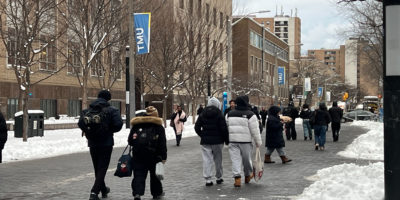By Heidi Lee and Libaan Osman
More than 35,000 people have signed an online petition requesting the Faculty of Communication and Design (FCAD) create an action plan to improve racial representation and equity in FCAD.
Titled “Approving a Ryerson Black student action plan,” the petition was created by Benjamin Mitchell, a third-year performance student. Mitchell created the petition in response to Ryerson president Mohamed Lachemi’s June 2 statement condemning “racism, bigotry and hatred” following worldwide protests against police brutality and anti-Black racism.
In the petition, Mitchell said that the response from Ryerson and FCAD were not enough to address the issue, adding that Ryerson’s weekly Black Student Support Group is an important resource but is not enough.
“FCAD needs to take a step back and look at what the problem really is and [the lack of Black representation] within staff, students and administrations,” said Mitchell.
Following the deaths of George Floyd in Minneapolis and Regis Korchinski-Paquet in Toronto, social media users have been circulating resources, donation sites and online petitions to support and stand in solidarity with Black communities.
However, Mitchell said he would like to go beyond social media and call for a plan of action that focuses on four main areas: representation, diversification, exposure in social events and resources.
“I want to change something that directly affects my life,” he said. “I am actually actively searching for change.”
According to Ryerson’s 2018 Employee Diversity Self-ID Report, 6,000 employees in the university were surveyed and 16 per cent of the respondents identified as Black. In terms of student and faculty representation, 26 per cent of responding full-time faculty members identified as racialized compared to 57 per cent of students.
Charles Falzon, dean of FCAD, wrote in an email to students on June 3 that the school will be creating a new Equity, Diversity and Inclusion (EDI) initiative that will be “committed to supporting our diverse students, faculty, and staff.”
According to Falzon, the EDI advisory committee is expected to look into “structural and systemic inequalities that are faced by the diverse communities that make up our community.”
Mitchell said he has accepted a spot on the EDI advisory committee. He hopes the school can start introducing Black guest speakers and part-time staff into the community, then hire more candidates of colour, resulting in a more diverse teaching staff.
He also said the faculty could encourage more Black students to enrol in FCAD programs by sharing students’ work to high schools with a high population of Black students.
Former Ryerson Students’ Union vice-president education and recent RTA graduate Kwaku Agyemang signed the petition, but wasn’t surprised about the overwhelming support for the plan.
“There’s been several advocacy efforts to make FCAD more inclusive to specific minority groups,” said Agyemang. “Students have identified this as an issue and have been doing so much work. It’s rooted in the culture of the program itself.”
In addition, Mir Asoh, a third-year creative industries student, said they’re hoping for Black community leaders at Ryerson to be part of the consultation and discussions if FCAD moves forward with the action plan.
“This is a great start. I want students to know that their voice has power. The university should really consider this [but] not in closed doors. I don’t think the university should come up with a Black action plan by themselves.”
Asoh was the events and campaign coordinator for the Racialised Students’ Collective for the last academic year. In the past week, they have been working on drafting a letter to the dean of FCAD and heads of the creative industries program after they both released a statement of solidarity with the Black Lives Matter movement.
“[Ryerson] can be performative or they can choose not to be performative,” said Asoh. “What will be most helpful is going to meet with the Black student leadership already on campus.”
Mitchell said having a Black students’ association in FCAD and providing student support seminars led by racialized staff would be beneficial in creating a positive environment for Black students in the faculty.
He also believes more could be done to include non-Black Ryerson members in anti-racism conversations as well.
“You can’t change something without having everyone present at the table,” he said. “A couple of my friends have experienced [discrimination] and I don’t want that to happen again, especially to new students.”
Agyemang said he feels like he will be missing out after graduating this year.
“Now, there’s going to be so much support for racialized students within FCAD,” said Agyemang. “That could’ve helped me feel more supportive from my professors, get more opportunities [and] helped me feel more included in school.”
Agyemang said he’s looking forward to seeing how Black community leaders are involved in the action plan if approved by FCAD but is pleased with how specific the demands of the petition were.
“Things sort of get lost when you say diversity and inclusion,” said Agyemang. “I hope the action plan is focused on dismantling white privilege within the program and acknowledging that [white and non-Black students] have different advantages over Black students.”












Leave a Reply